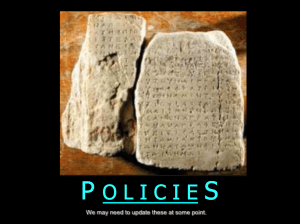SEC: New Faces Coming Soon, Muni “industry bars” and Harvey impact, Winners (and Losers) in the Omnibus Spending Bill Signed Last Week, Editor Analysis: Non-profit Healthcare & Challenges in 2015 and The Post Issuance Compliance Webinar Training – the Basics…
CURRENT EVENTS
SEC News this Week…
Goldsholle to Join SEC (B Buyer, December 18, 2014)
Santa is coming early to the SEC:
Gary Goldsholle has been tapped as the Securities and Exchange Commission’s new deputy director of trading and markets division, beginning in 2015. Goldsholle, who was formerly the MSRBs general counsel for two years, also spent over a decade at the Financial Industry Regulatory Authority (FINRA) for more than a decade. He will oversee the office of general counsel, clearance and settlement, and market supervision.
Goldsholle is joined by Gary Barnett, who was the division director of swap dealer and intermediary oversight at the Commodity Futures Trading Commission.
“I am pleased to announce these additions to our staff,” said Stephen Luparello, director of the trading and markets division. “Each brings a wealth of experience that will help us execute our broad and important policy agenda.”
[Editor’s Note: Both Goldsholle and Barnett bring broad and extensive industry and legal clout to their new positions…and seem eager to advance the SECs mission. Read on…]
SEC Quietly Seeks Industry Bars Against Muni Officials (B Buyer, December 17, 2014)
The Bond Buyer’s Commentary last week really hit a nerve…
Looking at several recent Securities and Exchange Commission muni enforcement cases, it appears the agency is quietly seeking a new sanction: “industry bars” against municipal officials.
So what does this mean?
With recent enforcement efforts where the SEC has focused on holding the public official accountable under the “control person” theory (think – Allan Park) for continuing disclosure violations, we should all be taking note. Additionally, Harvey, Illinois and its controller faced similar “barring” actions back in June.
On Dec. 8 in the Harvey case, the court issued its preliminary ruling granting the SEC’s request for the bar sanction. The court ruled that, “[t]here is good cause to believe that [defendant] is unfit to continue as a participant in municipal bond offerings.” (Also see settlement article below)
The SEC’s decision to start targeting municipal officials directly is a dramatic departure from prior policy where the municipal officials received significant leniency.
In the nutshell, if an official receives an industry bar (a court order that prohibits him/her from participating in future offerings of municipal securities), this would essentially end their career in the municipal sector.
How can this happen?
Well, there is a “catch-all” provision under the Securities Exchange Act of 1934 — Section 21(d)(5), which states, “In any action or proceeding brought or instituted by the Commission under any provision of the securities laws, the Commission may seek, and any Federal court may grant, any equitable relief that may be appropriate or necessary for the benefit of investors.”
The sanction is even more significant now that the filing deadline for the Municipalities Continuing Disclosure Cooperation (MCDC) Initiative has passed. There is some expectation of enforcement actions from the SECs review of the issuer’s self-reports.
[Editor’s Note: The MCDC is just the beginning. The SEC is clearly expecting municipal officials to be responsible in ensuring that disclosures and official statements are not misleading to investors. We will have to see what issues emerge and what the SEC deems to be material for enforcement.]
Federal Judge OKs Harvey Settlement with SEC (B Buyer, December 12, 2014)
On December 10th a federal judge approved the Harvey, Illinois settlement with the SEC over misleading investors and not properly using bond funds as intended.
In June, the SEC filed, as a first such action of its kind, an emergency court order to stop a current bond offering by the City while the prior bonds were under investigation.
Harvey had diverted about $1.7 million from its 2008, 2009 and 2010 offerings that were supposed to finance a hotel and conference center. The projects were later abandoned.
The city, while not admitting fault, agreed to:
- Cease and desist in violating Securities laws
- Hire an independent consultant and audit firm
- Not issue municipal bonds for three years without an SEC-approved disclosure counsel
Litigation is still pending against former Harvey comptroller Joseph T. Letke
[Editor’s Note: Just further evidence why robust post issuance compliance and continuing disclosure procedures are so important.]
While Over at the IRS/Treasury….
Congress Passes Extenders Bill; Obama Signs Omnibus (B Buyer, December 17, 2014)
Going right up to the wire, Congress passed a $1.01 trillion omnibus bill to fund most of the government through September, as  well as $41.6 billion in “tax extenders” including certain bond-related provisions as follows:
well as $41.6 billion in “tax extenders” including certain bond-related provisions as follows:
- $400 million for qualified zone academy bonds in 2014, tax-credit bonds for public schools
- The incentives include empowerment zone facility bonds,
- Public schools in empowerment zones can be eligible for QZABs.
Additionally, the SEC’s budget increased by $150 million over last year, but was $200 million less than requested by the President. More than 40 tax law provisions were extended, which will affect 2014 filings and programs with carry over provisions.
An example is that taxpayers will still be allowed to deduct state and general sales taxes instead of state and local income taxes. This will benefit taxpayers in Texas, Florida and Washington – where there is no income tax.
On the down side, certain key cuts are:
- major funding cuts for the Internal Revenue Service
- reversed a Dodd-Frank Act provision aimed at reducing taxpayer exposure to derivatives
- $100 million from the Transportation Investment Generating Economic Recovery (TIGER)
- $30 million cut from The Community Development Block Grant, or CDBG, program
[Editor’s Note: Although there was significant talk about removing the tax-exemption for municipal bonds, it did not occur. It will be interesting to see what the “major cuts for the IRS” will mean for all of us as taxpayers during filing season…and for the TEB Division.]
OUT & ABOUT
.Conferences in early 2015:
The Bond Buyer’s National Outlook 2015 Conference, January 27, 2015
Metropolitan Club, New York, NY
The Bond Buyer’s Texas Public Finance Conference, February 9-11, 2015
Omni Barton Creek Resort & Spa, Austin, TX
The Bond Buyer and BDA’s National Municipal Bond Summit March 1-3, 2015
The Westin Beach Resort & Spa, Fort Lauderdale, FL
Editor Commentary: Non-Profit Healthcare Will Face Challenges in 2015
Standard & Poors, which released its sector outlook report Wednesday, joined Fitch and Moody’s in taking a negative stance on the non-profit healthcare sector while it does see some glimmer of hope.
The potential impact of the King vs. Burwell case before the U.S. Supreme Court is weighing heavily on the negative outlook while the credit rating remains stable. This decision could eliminate subsidies for millions of newly insured people and the direct impact of lost reimbursement with an increase in the cost to treat uninsured patients.
S&P also noted that Days Cash on Hand and Maximum Annual Debt Service – both two key ratios for credit and issuing debt – remained flat year over year, despite a stronger investment year coupled with higher donations.
Fitch’s negative sector forecast, like 2013, details uncertainty faced by healthcare management teams in navigating the uncertainties of implementing the Affordable Care Act. These include changing care delivery/reimbursement modes as well as political and legal uncertainties.
Moody’s focused on operating margins, cash flow and revenue growth as well as the uneven implementation of the ACA between the states.
All three agree on the following points:
- Weak revenue growth
- Margin contraction and reimbursement model pressures
- Low patient volume
- Credit gap between larger, higher-rated providers and smaller, lower-rated ones may worsen
Two other key factors weighed heavily: Capital spending and the fact that 24 states opted out of the Medicaid expansion as part of the ACA.
Capital spending remains sluggish as “providers continue to build up a cushion,” Jennifer Soule from S&P said. “Many providers are being judicious with their capital plans,” said Soule.
“We’ve seen some pull back on originally budgeted capital plans as they assess their operating performance. If it was weaker, they delayed the plan.” She also added that capital spending would be even less if not for the significant spending on information technology.
In the states without expanded Medicaid, hospitals stand to lose over $160 billion over 10 years, while their states will lose an additional $400 billion.
The 24 states are Alabama, Alaska, Florida, Georgia, Idaho, Indiana, Kansas, Louisiana, Maine, Mississippi, Missouri, Montana, Nebraska, North Carolina, Oklahoma, Pennsylvania, South Carolina, South Dakota, Tennessee, Texas, Utah, Virginia, Wisconsin, Wyoming.
While downgrades outpaced upgrades in 2014, the vast majority of the ratings (78%) were affirmations of prior ratings.
All three agencies indicated the outlook could change to stable if patient volumes increase and stabilize and if the impacts of the rocky implementation of the ACA smooth out.
[Editor’s Note: Healthcare has been in a tremendous state of flux for the last five years. Being fully 15% of our GDP on an annual basis, the productivity, quality of care and overall health of these hospitals will remain vital.]
Post Issuance Compliance – The Basics
What a great time we had last Thursday, for our first online webinar on Post Issuance Compliance – the Basics.
- The 10-Step Compliance Framework – The Basics
- Policies 101
- Designing a Team Approach (a Network) to Successful Compliance
Although we just scratched the surface, the information was issuer-results-focused and geared toward addressing the accounting and process improvements you identified in the survey in October.
Stay tuned for more educational opportunities coming in early 2015!
Next Monday Muni Minutes – January 5, 2015
As we head into Christmas on this week, our thoughts turn to family, friends and quality time away from the office. In order to allow our teams at iCompass Compliance Solutions and Issuer 2 Issuer to spend a long weekend with their families, we will not publish the Monday Muni Minutes on Monday, December 29th.
Of course, if something of interest comes up, we will surely send you a quick note via e-mail.
From our families to yours, we wish you a very Merry Christmas!
We hope you enjoyed this week’s edition of the Monday Muni Minutes. As always your comments are welcome…
To your compliance success,
Debbie
The greatest compliment you can pay us is to share this newsletter with your issuer friends….
P.S. The Monday Muni Minutes will not be published on December 29th, allowing our team to enjoy a long Christmas weekend with their families.
P.P. S Want a one-click way to get faster information? If you are on LinkedIn, you can get access to breaking muni news articles as well as interesting compliance tips and resources, posted by us several times a week. Join our private Group Page, and follow us on our Company Page.



